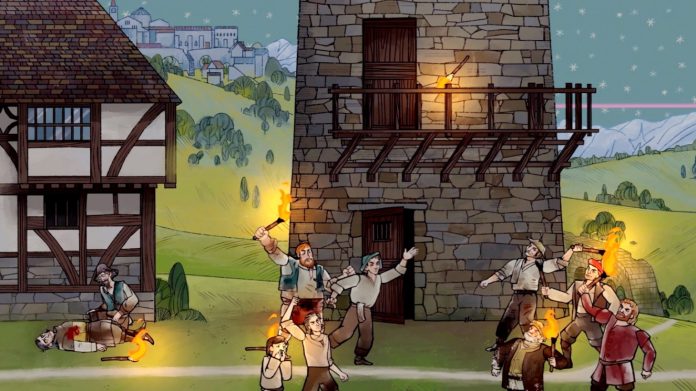Iain Dalton, Yorkshire Socialist Party
16th century Germany is an unusual setting for a video game. But in recent years themes of revolution have been increasingly common across all forms of media reflecting an increasingly volatile world, with multiple uprisings in different countries. Hence why the peasant revolts of the 1500s are the latest period to face adaptation.
Friedrich Engels famously wrote his book ‘The Peasant War in Germany’ reflecting on these events, in the light of the 1848 revolutions across Europe. Ultimately, uprisings against the intolerable conditions facing the peasantry at the time were unable to replace feudalism with a society that could meet the needs of the oppressed, due to the limited social development of society and the scattered nature of the peasantry that made it possible to isolate different uprisings.
You take the role of Andreas Maler, an artist visiting the fictional Keirsau Abbey near the town of Tassing, when your friend is accused of murdering a local baron also visiting the abbey. Future chapters see you investigate incidents in different periods of time.
This structure of the game allows you to see before, during and after the revolts take place. In the earliest section you see how the traditional means of the abbey sustaining itself, such as manuscript commissions from its scriptorium, are struggling in competition with new technology, such as the invention of the printing press. This contributes to pressure to increase tithes (taxes) on peasants, leading to the revolt.
Later sections deal with the revolt itself and its aftermath. These show the revolts not only from the differing perspectives of the peasants themselves, and their landlords (in this case the abbey’s leader Father Gernot), but also from the perspectives of others, such as tradespeople in the town, other monks, and travellers at the inn.
Moreover, unlike some other games that have dealt with revolutionary periods, there is no attempt to demonise the leaders of the revolt and, despite the tragic events that take place, several characters defend the necessity of the revolt against their intolerable conditions.
The final section also points to how history is recorded, as you have decisions to make about how to commemorate the town’s history, including the revolt itself. This is a comment on how ‘official’ history is generally recorded to serve certain interests and what gets left out as a result.
The game is also a love letter to the illustrative art of the period, to look like pages of an illuminated manuscript.
Large studios, such as Pentiment’s creators Obsidian Entertainment, typically produce generic games in search of a big audience and more profit. Pentiment is a welcome exception.
Imagine what could be possible if that profit motive was removed through bringing the big media monopolies into public ownership. If run under the democratic control of video game development workers, gamers and representatives of the wider working class, then resources could be planned into a varied content of entertainment experiences not subject to the need to make a quick buck.








